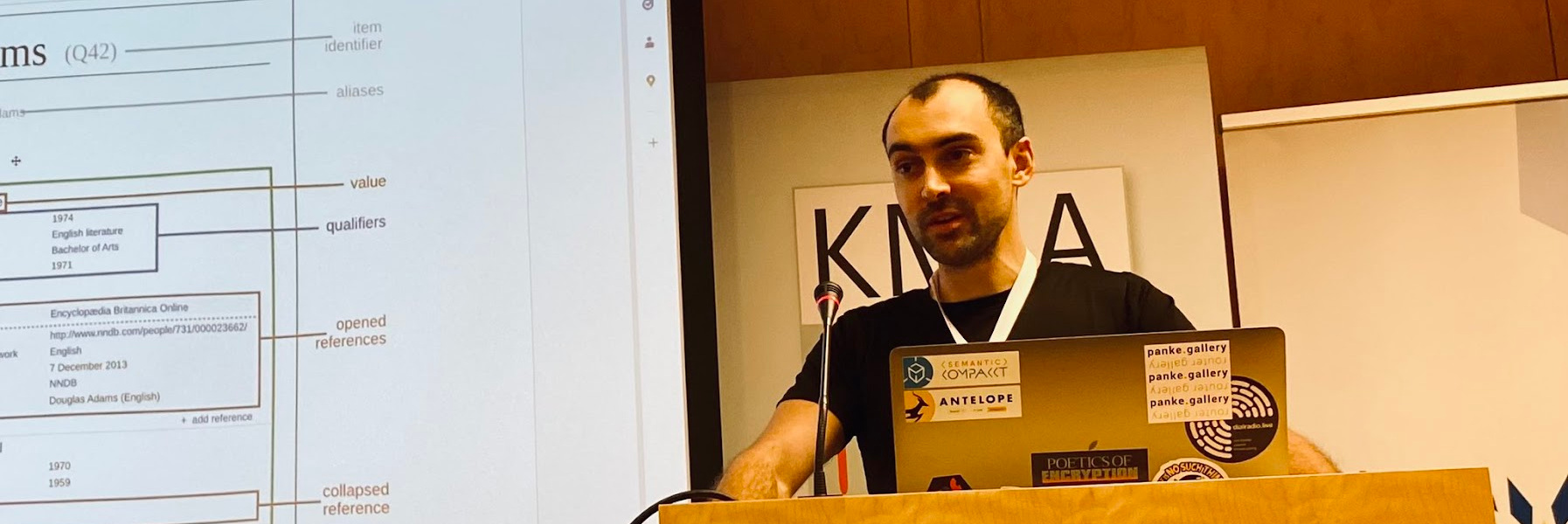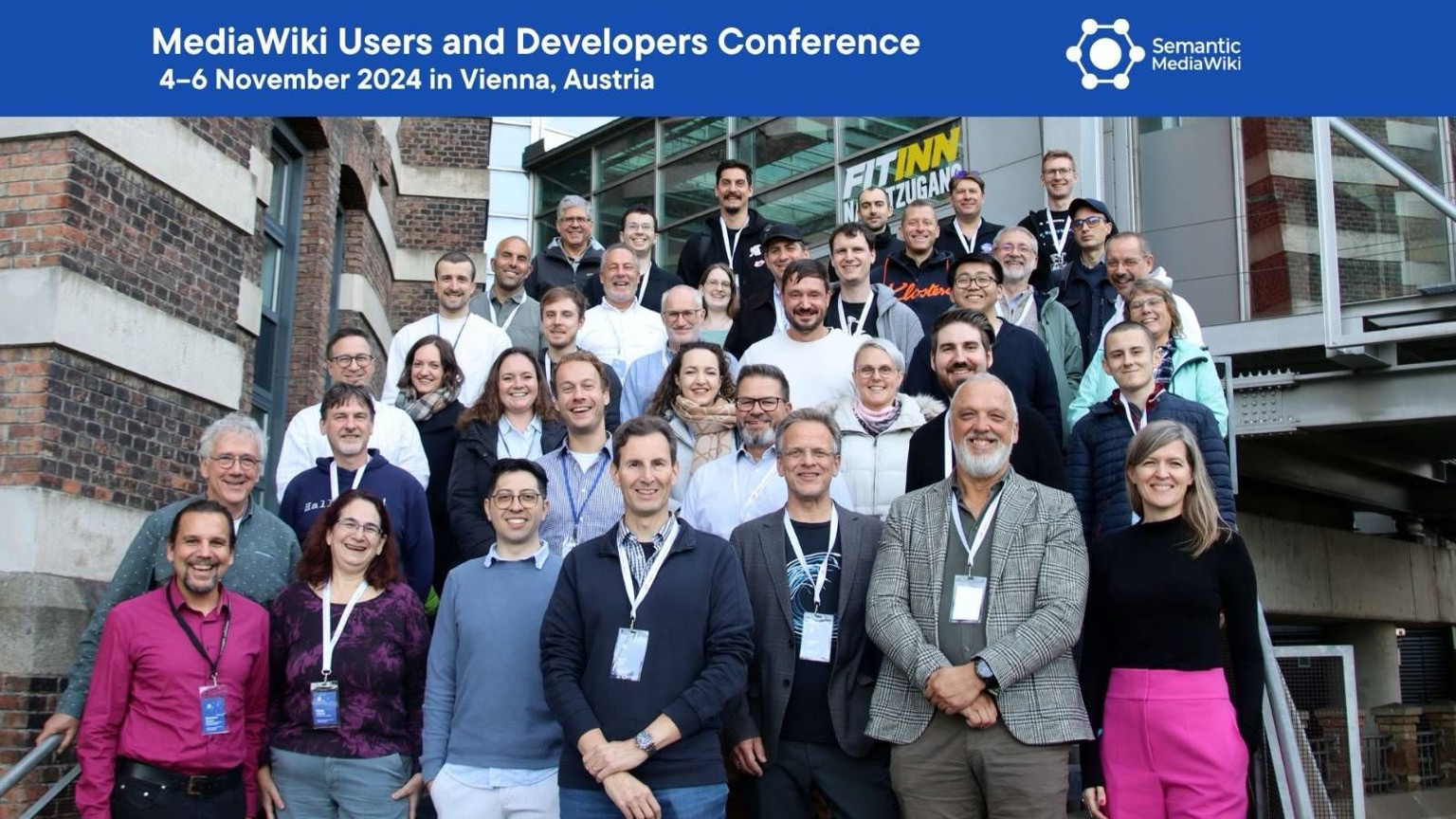
2024 MediaWiki Conference Highlights
Discover highlights from the first MediaWiki Users and Developers Conference in Europe.
MediaWiki Users and Developers Conference, or MUDCon for short, is a rebrand of the long-running Semantic MediaWiki Conference. The Fall 2024 edition took place in Vienna, and Professional Wiki was present as usual.
Table of Contents
- Connecting Wikibase and Semantic MediaWiki
- Simultaneous Editing with CollabPads
- Factors Influencing Wiki Success
- MediaWiki Strategic Plan
- New BlueSpice Features
- Wikibase Introduction: Managing Datasets & Collections
- Knowledge Management with MediaWiki at NASA
- LLMs and Local Knowledge
- Inline Comments Extension
- Panel: Knowledge Management and Semantics
- Wrap up
Connecting Wikibase and Semantic MediaWiki
Naturally, I am placing my own session first. It is a panel discussion with Lozana Rossenova, Kolja Bailly and myself about our Semantic Wikibase extension.
With Semantic Wikibase, you can make your Wikibase data available in Semantic MediaWiki. This opens the door for visualizations and embedded queries directly in your wiki, showcasing your Wikibase data. It also allows for form editing and aggregation of data.
We created Semantic Wikibase in 2020 as a prototype. Since then, TiB Hannover has enhanced the extension and started using it successfully on multiple wikis. Besides the panel, there also was a dedicated talk in which Kolja presented his Semantic Wikibase enhancements and some great-looking success stories.
Learn more via our dedicated Semantic Wikibase at MUDCon post.
Simultaneous Editing with CollabPads
Robert Vogel introduced CollabPads, a new extension that brings simultaneous editing to MediaWiki. This feature allows multiple users to collaborate on the same page in real-time, much like Google Docs or Etherpad.
Key Features:
- Integrated Editing Experience: Seamless integration into the standard editing workflow of MediaWiki
- Secure Collaboration: Authorization mechanism to ensure appropriate access permissions
- Session Management: Continuous collaboration with flexible joining and leaving of sessions
Factors Influencing Wiki Success
Semantic MediaWiki veteran Bernhard Krabina shared insights on the optimal use of wikis within organizations. Drawing from his experiences at Knowledge Management Associates (KM-A) and his PhD research on knowledge graphs and wikis, he emphasized that wikis excel in scenarios where knowledge creation is dynamic and collaborative. Features like MediaWiki's "red links" encourage content creation and facilitate organic growth, fostering a culture of knowledge sharing and transparency.
However, he cautioned that wikis might not suit all organizational needs, particularly when dealing with static documents like PDFs and PowerPoint presentations or requiring intricate access controls. In such cases, traditional document management systems may be more appropriate. Comparing MediaWiki to proprietary tools like Confluence, he noted that while Confluence offers a polished user interface and real-time editing, it comes with drawbacks such as cost and limited data structuring capabilities. MediaWiki, being open-source, provides greater flexibility and aligns with organizations seeking transparency and open collaboration.
To evaluate the effectiveness of wikis, Bernhard introduced the System Usability Scale (SUS) and the Unified Theory of Acceptance and Use of Technology (UTAUT) as frameworks. His studies on different wikis revealed that usability and acceptance are influenced by organizational culture and management support. He concluded with a call to action for organizations to assess why some wikis thrive while others fail, highlighting the importance of understanding user engagement and organizational support to implement wikis effectively for enhanced knowledge management.
Sidenote: I confirm that Bernhard is very sus.
MediaWiki Strategic Plan
Mateus Santos, a product manager at the Wikimedia Foundation, discussed the evolution of MediaWiki core and its extensions. He highlighted a significant shift in how the Wikimedia Foundation approaches MediaWiki, moving from treating it as a project to viewing it as a product. This change aims to ensure the platform's sustainability and ability to meet the needs of diverse users while supporting the Wikimedia mission.
Mateus emphasized the challenges of sustaining MediaWiki in a rapidly changing world, especially with the rise of generative AI and shifting content consumption patterns. On Wikipedia, MediaWiki must support over 25 billion global page views and 50 million edits per month across hundreds of languages, all while maintaining a collaborative contributor base.
Several key initiatives are underway to enhance MediaWiki:
- Parsoid Unification Project: Transitioning from the legacy parser to Parsoid to unify parsing infrastructure, improve performance, and simplify maintenance
- Release Management: Taking responsibility for MediaWiki's release management, with the upcoming 1.43 release being a long-term support version
- Automated API Documentation: Developing localized, interactive API documentation to support developers using MediaWiki's REST framework
- Simplifying Feature Development: Conducting a hook survey to explore ways to simplify feature development and reduce onboarding complexity
- Authentication Enhancements: Improving the Single User Login system for multiple wikis
New BlueSpice Features
BlueSpice is an enterprise MediaWiki distribution created by our partner HalloWelt GmbH. You can use BlueSpice as an integrated management system, a documentation system, an organizational manual, or a knowledge base.
Miriam Schlindwein presented new features created by the BlueSpice development team. She focused on those features that are independent from BlueSpice, and can thus be used on any MediaWiki installation. She covered these four extensions:
- NotifyMe: An improved notification system replacing the Echo extension, featuring grouped notifications and customizable email templates
- Enhanced Standard UIs: Redesigns of the All Pages and File List special pages with better readability, tree views for subpages, and customizable columns. The version history page now has a grid format for easier comparison
- AI Editing Assistant: An editing aid integrated with ChatGPT, allowing users to refine content with commands like "Make longer" or "Summarize"
- Number Headings: One of the most requested features is the ability to number MediaWiki page headings automatically. This feature is particularly useful for ensuring that tables of contents align with the content
These extensions enhance or redesign basic MediaWiki functionality.
Wikibase Introduction: Managing Datasets & Collections
Christos Varvantakis and Jon Amar from Wikimedia Deutschland presented updates on Wikibase. Wikibase is a bundle of MediaWiki extensions and services which allow users to create and manage open, linked knowledge bases with a flexible data model.
They said that Wikibase is widely used by researchers, scientists, and GLAM institutions (Galleries, Libraries, Archives, and Museums), with notable users including Wikidata, Wikimedia Commons, and OpenStreetMap.
They also talked about WMDE's two main Wikibase products: Wikibase Suite and Wikibase Cloud.
Wikibase Suite is for users who want to self-host Wikibase on their infrastructure. Wikimedia Deutschland plans to improve the versioning and release process, and provide better documentation. Instead of setting up your own Wikibase, you can also use our Wikibase hosting services.
Wikibase Cloud is free SaaS hosting for Wikibase. You can create your own Wikibase quickly without technical expertise. Customization options are limited. Wikibase Cloud is the budget alternative to our own Wikibase Cloud hosting. Learn more about differences in our Wikibase hosting comparison.
Knowledge Management with MediaWiki at NASA
Richard Evans from NASA's Armstrong Test Facility presented how MediaWiki is instrumental in supporting NASA's digital transformation initiatives. By leveraging "MediaWiki Plus"—MediaWiki enhanced with extensions like Semantic MediaWiki—Richard showcased how the platform can help organizations transition to more modern and efficient operations.
At the Armstrong Test Facility, MediaWiki Plus is used to digitize business processes, manage ISO compliance, and create electronic workflows, thereby improving collaboration and transparency. By capturing structured data within wiki pages, facilitating dynamic querying, and supporting management dashboards—all within an open-source framework—it provides a unified solution to outdated information systems.
Rich concluded by inviting the MediaWiki community to the Armstrong Test Facility for the MediaWiki Users and Developers Conference in spring 2025. He emphasized that with the right extensions, MediaWiki is uniquely positioned to aid large organizations like NASA in their digital transformation journey, enhancing knowledge management, operational efficiency, and fostering a culture of collaboration.
LLMs and Local Knowledge
Julia Neidhardt and Thomas Kolb, researchers from the Vienna University of Technology, presented on Digital Humanism, emphasizing the critical role of technology in society and the need for human-centric approaches. They discussed the Vienna Manifesto on Digital Humanism, a collaborative initiative aiming to promote democracy, inclusion, and responsible technology development.
Julia and Thomas highlighted the rise of Generative AI and its societal impact, including challenges like biases, misinformation, and ethical concerns. They stressed the importance of understanding these issues to develop more transparent and fair AI systems.
To make local knowledge more accessible, they experimented with integrating Large Language Models (LLMs) with local data sources. Using frameworks like LangChain and LlamaIndex, they developed a chatbot that combines their open-access books on digital humanism with AI models like GPT. This approach leverages techniques such as retrieval-augmented generation (RAG) and embeddings to improve information retrieval and user interaction.
They also discussed technical challenges, including data chunking strategies, embedding updates, and balancing model performance with computational resources. The team emphasized the opportunities in enhancing accessibility and supporting diverse users while acknowledging risks like hallucinations, scalability issues, and inherent biases in AI models.
📑 View the presentation slides
Learn more about MediaWiki and AI integration possibilities.
Inline Comments Extension
Yaron Koren presented the Inline Comments extension, a new tool that brings inline commenting and annotations to MediaWiki pages, similar to features found in Google Docs or Confluence.
Key Features of the Inline Comments Extension:
- Inline Commenting and Threaded Discussions: Users can add comments directly within the text of a wiki page, fostering collaborative discussions and feedback
- @-Tagging and Notifications: The extension supports @-tagging to mention specific users, triggering Echo notifications to alert them of comments or replies
- Editing and Version History: Comments can be edited using a pencil icon, and all changes are tracked in the page's version history. The extension utilizes MediaWiki's slots feature to store comments separately, ensuring they are included in revision histories and recent changes
- Filtering in Recent Changes: Users can filter recent changes to view only inline comments, making it easier to monitor discussions and manage
Panel: Knowledge Management and Semantics
In this panel at the end of the conference's second day, Karsten Ehms, Cindy Cicalese, and Rich Evans touched on both practical and philosophical aspects of knowledge management. The conversation was particularly noteworthy for how it revealed common challenges across different organizations, from NASA to corporate environments.
The conversation touched on data sovereignty, building trust, open-source, and the evolution of wikis to simple repositories to operational tools.
Everyone is a knowledge user. In a modern organization - it doesn't have to be an IT-focused organization - people who show up for work every day, regardless of what they do, there is a dimension of what they do that is knowledge oriented.-- Rich Evans
Wrap up
I greatly enjoyed this conference. It was a pleasure to reconnect with many of the usual suspects and make new connections. As always with these events, the most valuable part was the conversations in the hallways, over dinner, and in the hotel lobby at 2AM when Richard is fixing his slides for the next day.
Thanks to the conference organizers Bernhard Krabina and Sabine Melnicki. You did an awesome job! 🎉

View the complete MediaWiki Users and Developers Conference Fall 2024 YouTube Playlist or our event blog posts. Or check out the conference pictures.
Let us help you with your knowledge management or MediaWiki needs. Explore our MediaWiki services or contact us for MediaWiki consulting.
Participate
- Wikibase Faceted Search Released
- Semantic MediaWiki 5 Released
- Top Wikibase Extensions
- 2024 MediaWiki Conference Highlights
- Semantic Wikibase: 2024 Update
- We Partner with HalloWelt to Provide BlueSpice
- Semantic MediaWiki 4.2.0 Released
- Is Wikibase Right for Your Project?
- New Extension: Wikibase Export
- Semantic MediaWiki 4.1.0 released